Organisational Behaviour Report: Tesco, Culture, Motivation, and Teams
VerifiedAdded on 2021/02/21
|13
|3680
|208
Report
AI Summary
This report delves into the organisational behaviour of Tesco, examining how culture, politics, and power dynamics influence individual and team performance. It analyses the impact of Handy's cultural framework, exploring power structures and their effects. The report then investigates motivational theories, including Maslow's hierarchy of needs, Herzberg's two-factor theory, and process theories like equity and expectancy. It evaluates how Tesco applies these theories to enhance employee motivation and achieve organisational goals. Furthermore, the report explores team and group development theories, such as Tuckman's stages of group development and Belbin's team roles, to assess team effectiveness. Finally, it applies these concepts and theories to real-world business situations within Tesco, offering insights into improving organisational effectiveness and employee engagement.
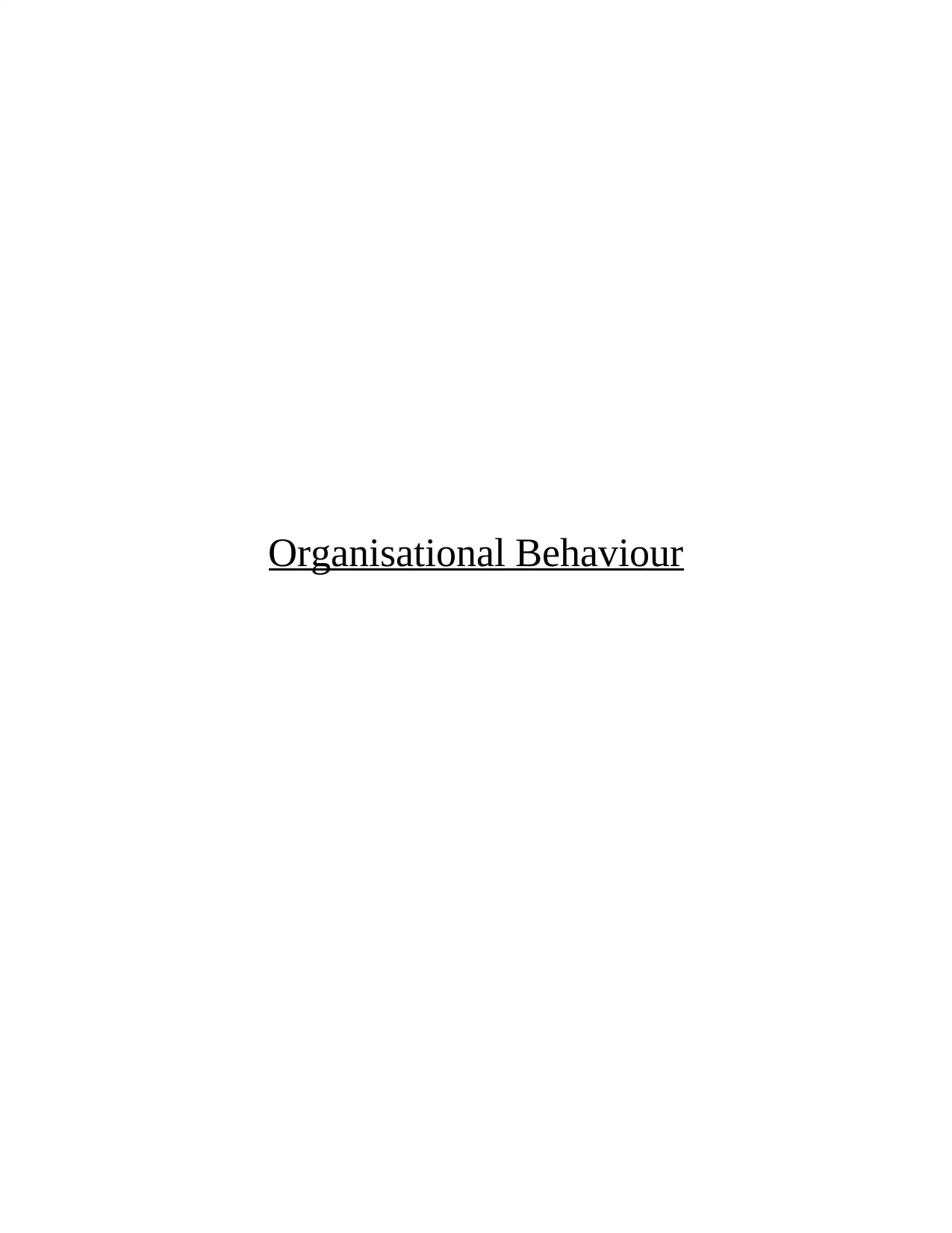
Organisational Behaviour
Paraphrase This Document
Need a fresh take? Get an instant paraphrase of this document with our AI Paraphraser
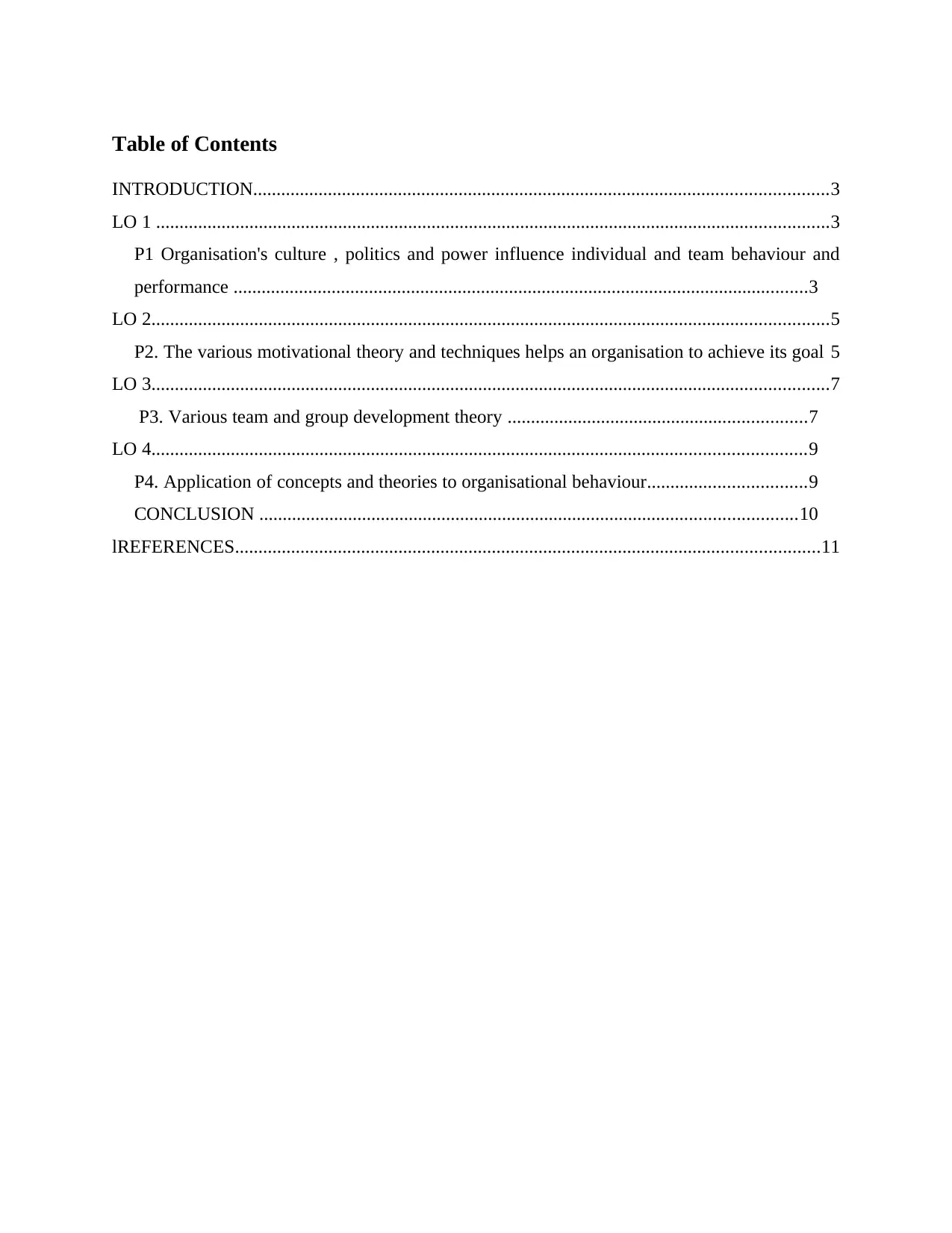
Table of Contents
INTRODUCTION...........................................................................................................................3
LO 1 ................................................................................................................................................3
P1 Organisation's culture , politics and power influence individual and team behaviour and
performance ...........................................................................................................................3
LO 2.................................................................................................................................................5
P2. The various motivational theory and techniques helps an organisation to achieve its goal 5
LO 3.................................................................................................................................................7
P3. Various team and group development theory ................................................................7
LO 4............................................................................................................................................9
P4. Application of concepts and theories to organisational behaviour..................................9
CONCLUSION ...................................................................................................................10
lREFERENCES.............................................................................................................................11
INTRODUCTION...........................................................................................................................3
LO 1 ................................................................................................................................................3
P1 Organisation's culture , politics and power influence individual and team behaviour and
performance ...........................................................................................................................3
LO 2.................................................................................................................................................5
P2. The various motivational theory and techniques helps an organisation to achieve its goal 5
LO 3.................................................................................................................................................7
P3. Various team and group development theory ................................................................7
LO 4............................................................................................................................................9
P4. Application of concepts and theories to organisational behaviour..................................9
CONCLUSION ...................................................................................................................10
lREFERENCES.............................................................................................................................11
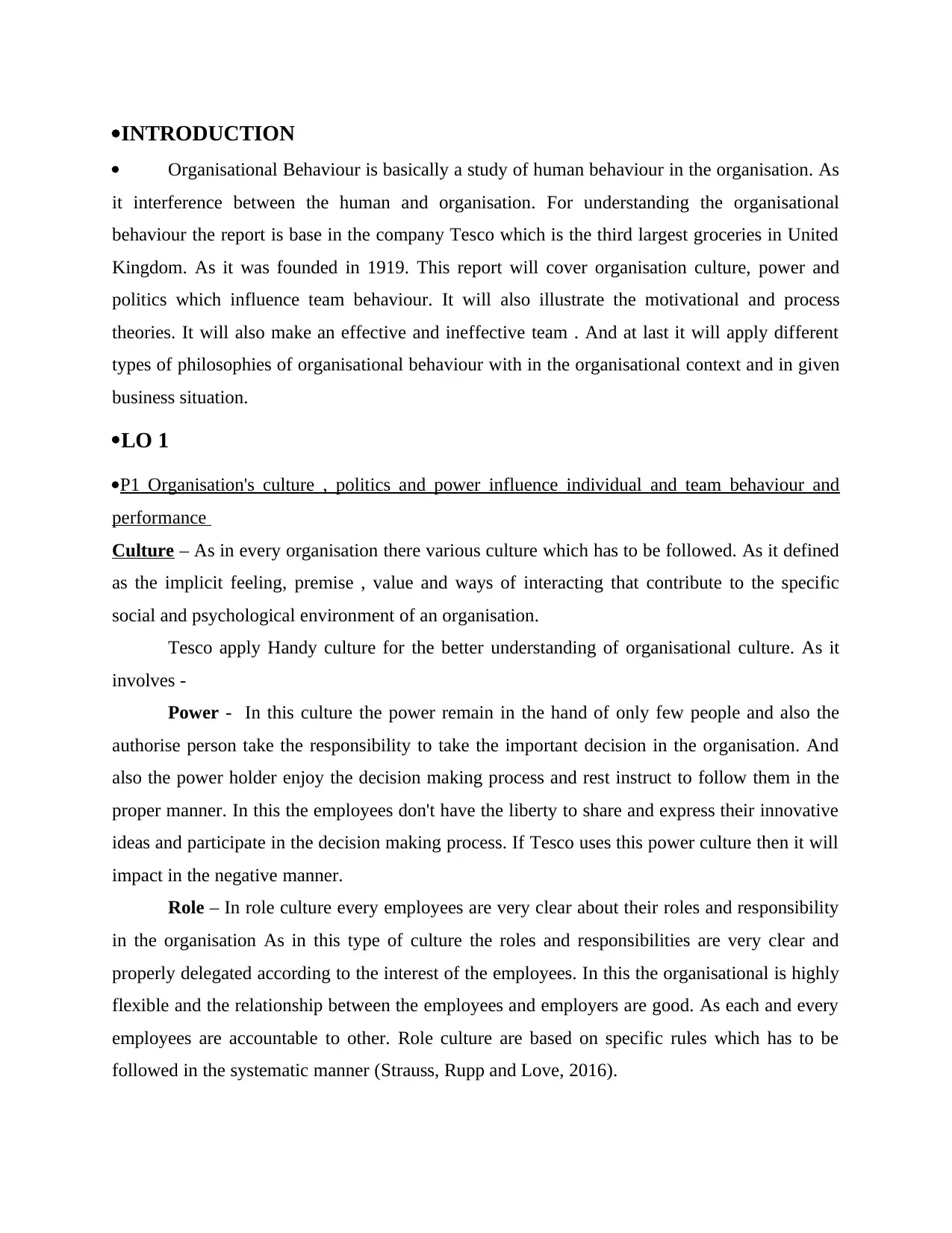
·INTRODUCTION
· Organisational Behaviour is basically a study of human behaviour in the organisation. As
it interference between the human and organisation. For understanding the organisational
behaviour the report is base in the company Tesco which is the third largest groceries in United
Kingdom. As it was founded in 1919. This report will cover organisation culture, power and
politics which influence team behaviour. It will also illustrate the motivational and process
theories. It will also make an effective and ineffective team . And at last it will apply different
types of philosophies of organisational behaviour with in the organisational context and in given
business situation.
·LO 1
·P1 Organisation's culture , politics and power influence individual and team behaviour and
performance
Culture – As in every organisation there various culture which has to be followed. As it defined
as the implicit feeling, premise , value and ways of interacting that contribute to the specific
social and psychological environment of an organisation.
Tesco apply Handy culture for the better understanding of organisational culture. As it
involves -
Power - In this culture the power remain in the hand of only few people and also the
authorise person take the responsibility to take the important decision in the organisation. And
also the power holder enjoy the decision making process and rest instruct to follow them in the
proper manner. In this the employees don't have the liberty to share and express their innovative
ideas and participate in the decision making process. If Tesco uses this power culture then it will
impact in the negative manner.
Role – In role culture every employees are very clear about their roles and responsibility
in the organisation As in this type of culture the roles and responsibilities are very clear and
properly delegated according to the interest of the employees. In this the organisational is highly
flexible and the relationship between the employees and employers are good. As each and every
employees are accountable to other. Role culture are based on specific rules which has to be
followed in the systematic manner (Strauss, Rupp and Love, 2016).
· Organisational Behaviour is basically a study of human behaviour in the organisation. As
it interference between the human and organisation. For understanding the organisational
behaviour the report is base in the company Tesco which is the third largest groceries in United
Kingdom. As it was founded in 1919. This report will cover organisation culture, power and
politics which influence team behaviour. It will also illustrate the motivational and process
theories. It will also make an effective and ineffective team . And at last it will apply different
types of philosophies of organisational behaviour with in the organisational context and in given
business situation.
·LO 1
·P1 Organisation's culture , politics and power influence individual and team behaviour and
performance
Culture – As in every organisation there various culture which has to be followed. As it defined
as the implicit feeling, premise , value and ways of interacting that contribute to the specific
social and psychological environment of an organisation.
Tesco apply Handy culture for the better understanding of organisational culture. As it
involves -
Power - In this culture the power remain in the hand of only few people and also the
authorise person take the responsibility to take the important decision in the organisation. And
also the power holder enjoy the decision making process and rest instruct to follow them in the
proper manner. In this the employees don't have the liberty to share and express their innovative
ideas and participate in the decision making process. If Tesco uses this power culture then it will
impact in the negative manner.
Role – In role culture every employees are very clear about their roles and responsibility
in the organisation As in this type of culture the roles and responsibilities are very clear and
properly delegated according to the interest of the employees. In this the organisational is highly
flexible and the relationship between the employees and employers are good. As each and every
employees are accountable to other. Role culture are based on specific rules which has to be
followed in the systematic manner (Strauss, Rupp and Love, 2016).
⊘ This is a preview!⊘
Do you want full access?
Subscribe today to unlock all pages.

Trusted by 1+ million students worldwide
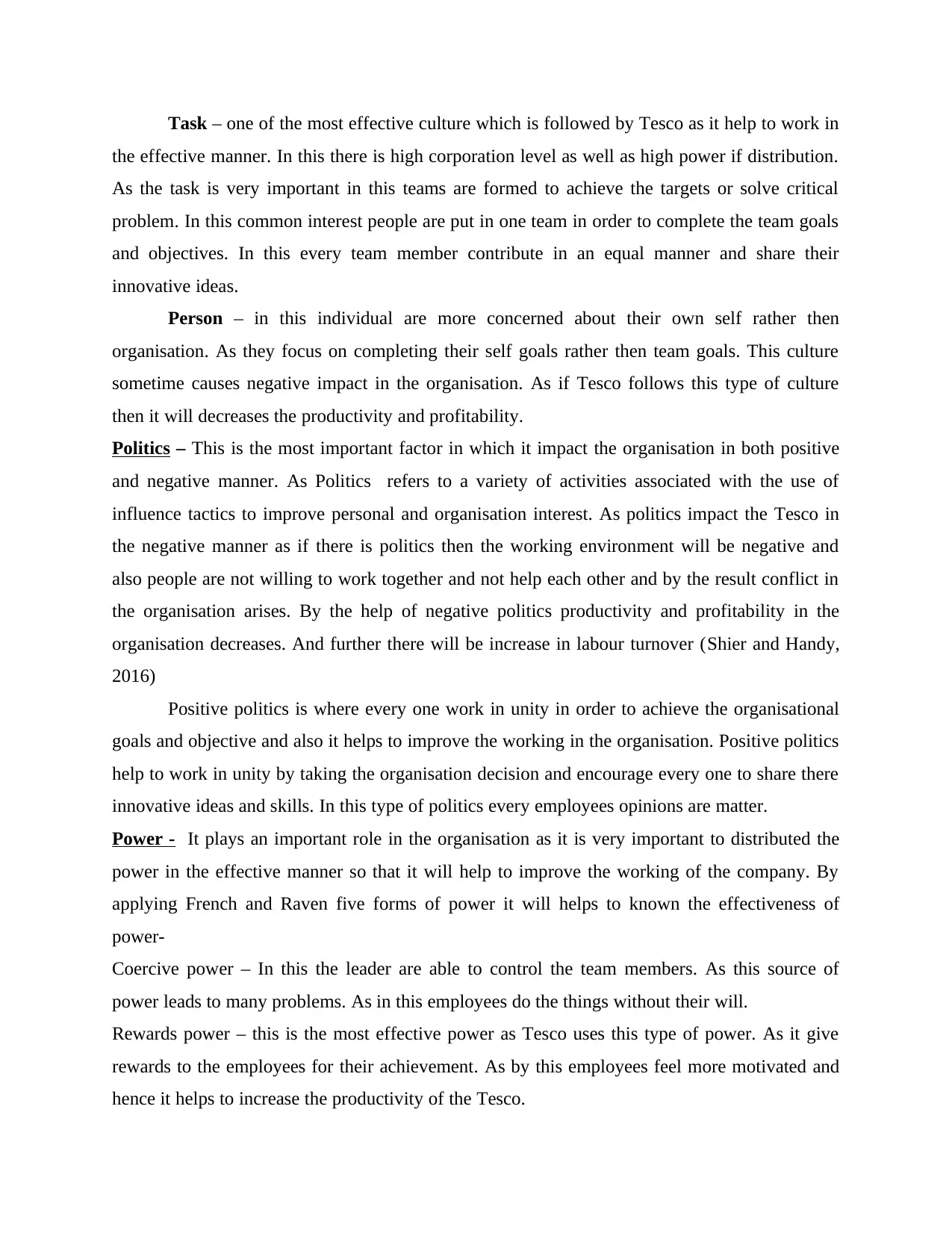
Task – one of the most effective culture which is followed by Tesco as it help to work in
the effective manner. In this there is high corporation level as well as high power if distribution.
As the task is very important in this teams are formed to achieve the targets or solve critical
problem. In this common interest people are put in one team in order to complete the team goals
and objectives. In this every team member contribute in an equal manner and share their
innovative ideas.
Person – in this individual are more concerned about their own self rather then
organisation. As they focus on completing their self goals rather then team goals. This culture
sometime causes negative impact in the organisation. As if Tesco follows this type of culture
then it will decreases the productivity and profitability.
Politics – This is the most important factor in which it impact the organisation in both positive
and negative manner. As Politics refers to a variety of activities associated with the use of
influence tactics to improve personal and organisation interest. As politics impact the Tesco in
the negative manner as if there is politics then the working environment will be negative and
also people are not willing to work together and not help each other and by the result conflict in
the organisation arises. By the help of negative politics productivity and profitability in the
organisation decreases. And further there will be increase in labour turnover (Shier and Handy,
2016)
Positive politics is where every one work in unity in order to achieve the organisational
goals and objective and also it helps to improve the working in the organisation. Positive politics
help to work in unity by taking the organisation decision and encourage every one to share there
innovative ideas and skills. In this type of politics every employees opinions are matter.
Power - It plays an important role in the organisation as it is very important to distributed the
power in the effective manner so that it will help to improve the working of the company. By
applying French and Raven five forms of power it will helps to known the effectiveness of
power-
Coercive power – In this the leader are able to control the team members. As this source of
power leads to many problems. As in this employees do the things without their will.
Rewards power – this is the most effective power as Tesco uses this type of power. As it give
rewards to the employees for their achievement. As by this employees feel more motivated and
hence it helps to increase the productivity of the Tesco.
the effective manner. In this there is high corporation level as well as high power if distribution.
As the task is very important in this teams are formed to achieve the targets or solve critical
problem. In this common interest people are put in one team in order to complete the team goals
and objectives. In this every team member contribute in an equal manner and share their
innovative ideas.
Person – in this individual are more concerned about their own self rather then
organisation. As they focus on completing their self goals rather then team goals. This culture
sometime causes negative impact in the organisation. As if Tesco follows this type of culture
then it will decreases the productivity and profitability.
Politics – This is the most important factor in which it impact the organisation in both positive
and negative manner. As Politics refers to a variety of activities associated with the use of
influence tactics to improve personal and organisation interest. As politics impact the Tesco in
the negative manner as if there is politics then the working environment will be negative and
also people are not willing to work together and not help each other and by the result conflict in
the organisation arises. By the help of negative politics productivity and profitability in the
organisation decreases. And further there will be increase in labour turnover (Shier and Handy,
2016)
Positive politics is where every one work in unity in order to achieve the organisational
goals and objective and also it helps to improve the working in the organisation. Positive politics
help to work in unity by taking the organisation decision and encourage every one to share there
innovative ideas and skills. In this type of politics every employees opinions are matter.
Power - It plays an important role in the organisation as it is very important to distributed the
power in the effective manner so that it will help to improve the working of the company. By
applying French and Raven five forms of power it will helps to known the effectiveness of
power-
Coercive power – In this the leader are able to control the team members. As this source of
power leads to many problems. As in this employees do the things without their will.
Rewards power – this is the most effective power as Tesco uses this type of power. As it give
rewards to the employees for their achievement. As by this employees feel more motivated and
hence it helps to increase the productivity of the Tesco.
Paraphrase This Document
Need a fresh take? Get an instant paraphrase of this document with our AI Paraphraser
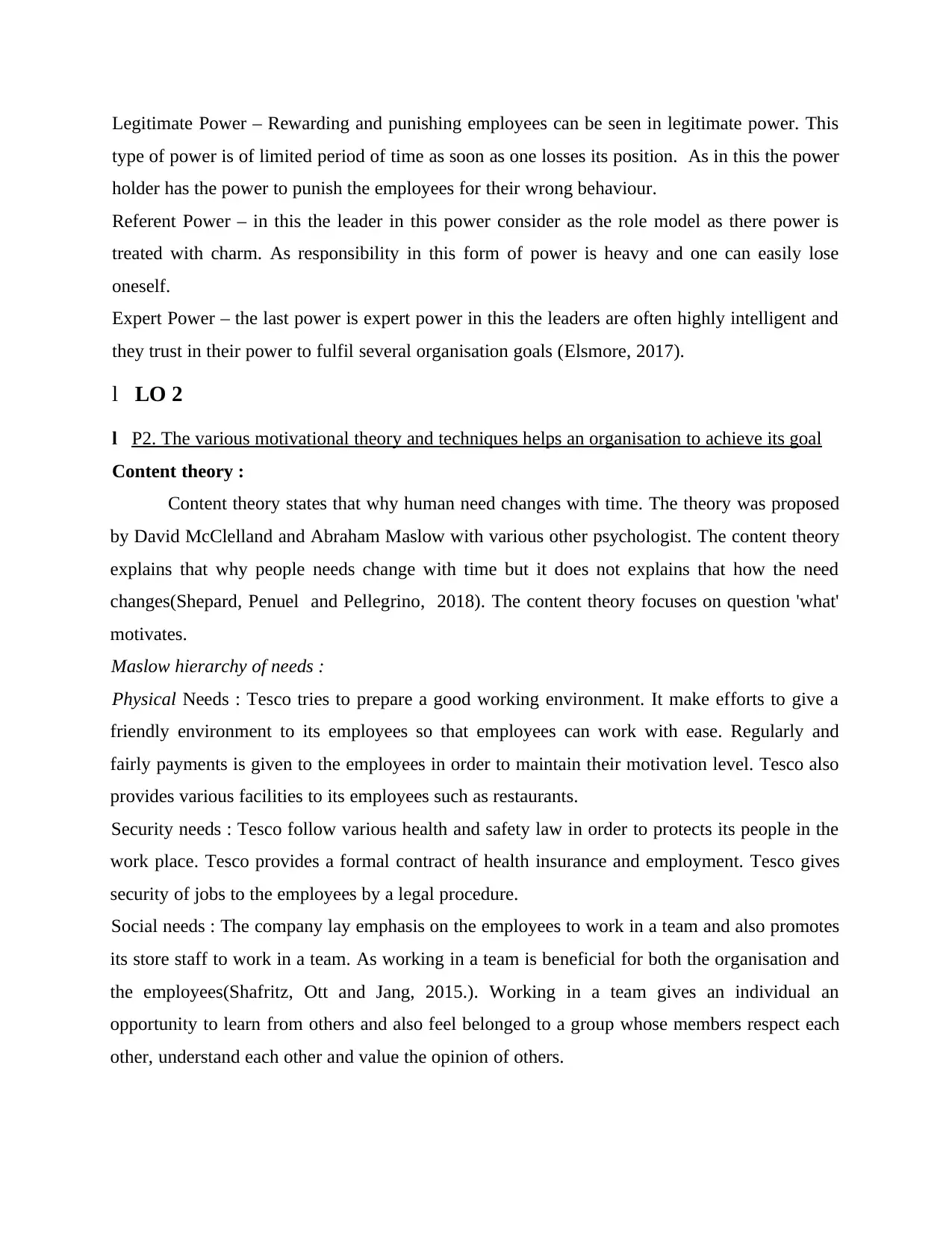
Legitimate Power – Rewarding and punishing employees can be seen in legitimate power. This
type of power is of limited period of time as soon as one losses its position. As in this the power
holder has the power to punish the employees for their wrong behaviour.
Referent Power – in this the leader in this power consider as the role model as there power is
treated with charm. As responsibility in this form of power is heavy and one can easily lose
oneself.
Expert Power – the last power is expert power in this the leaders are often highly intelligent and
they trust in their power to fulfil several organisation goals (Elsmore, 2017).
l壱LO 2
l弐P2. The various motivational theory and techniques helps an organisation to achieve its goal
Content theory :
Content theory states that why human need changes with time. The theory was proposed
by David McClelland and Abraham Maslow with various other psychologist. The content theory
explains that why people needs change with time but it does not explains that how the need
changes(Shepard, Penuel and Pellegrino, 2018). The content theory focuses on question 'what'
motivates.
Maslow hierarchy of needs :
Physical Needs : Tesco tries to prepare a good working environment. It make efforts to give a
friendly environment to its employees so that employees can work with ease. Regularly and
fairly payments is given to the employees in order to maintain their motivation level. Tesco also
provides various facilities to its employees such as restaurants.
Security needs : Tesco follow various health and safety law in order to protects its people in the
work place. Tesco provides a formal contract of health insurance and employment. Tesco gives
security of jobs to the employees by a legal procedure.
Social needs : The company lay emphasis on the employees to work in a team and also promotes
its store staff to work in a team. As working in a team is beneficial for both the organisation and
the employees(Shafritz, Ott and Jang, 2015.). Working in a team gives an individual an
opportunity to learn from others and also feel belonged to a group whose members respect each
other, understand each other and value the opinion of others.
type of power is of limited period of time as soon as one losses its position. As in this the power
holder has the power to punish the employees for their wrong behaviour.
Referent Power – in this the leader in this power consider as the role model as there power is
treated with charm. As responsibility in this form of power is heavy and one can easily lose
oneself.
Expert Power – the last power is expert power in this the leaders are often highly intelligent and
they trust in their power to fulfil several organisation goals (Elsmore, 2017).
l壱LO 2
l弐P2. The various motivational theory and techniques helps an organisation to achieve its goal
Content theory :
Content theory states that why human need changes with time. The theory was proposed
by David McClelland and Abraham Maslow with various other psychologist. The content theory
explains that why people needs change with time but it does not explains that how the need
changes(Shepard, Penuel and Pellegrino, 2018). The content theory focuses on question 'what'
motivates.
Maslow hierarchy of needs :
Physical Needs : Tesco tries to prepare a good working environment. It make efforts to give a
friendly environment to its employees so that employees can work with ease. Regularly and
fairly payments is given to the employees in order to maintain their motivation level. Tesco also
provides various facilities to its employees such as restaurants.
Security needs : Tesco follow various health and safety law in order to protects its people in the
work place. Tesco provides a formal contract of health insurance and employment. Tesco gives
security of jobs to the employees by a legal procedure.
Social needs : The company lay emphasis on the employees to work in a team and also promotes
its store staff to work in a team. As working in a team is beneficial for both the organisation and
the employees(Shafritz, Ott and Jang, 2015.). Working in a team gives an individual an
opportunity to learn from others and also feel belonged to a group whose members respect each
other, understand each other and value the opinion of others.
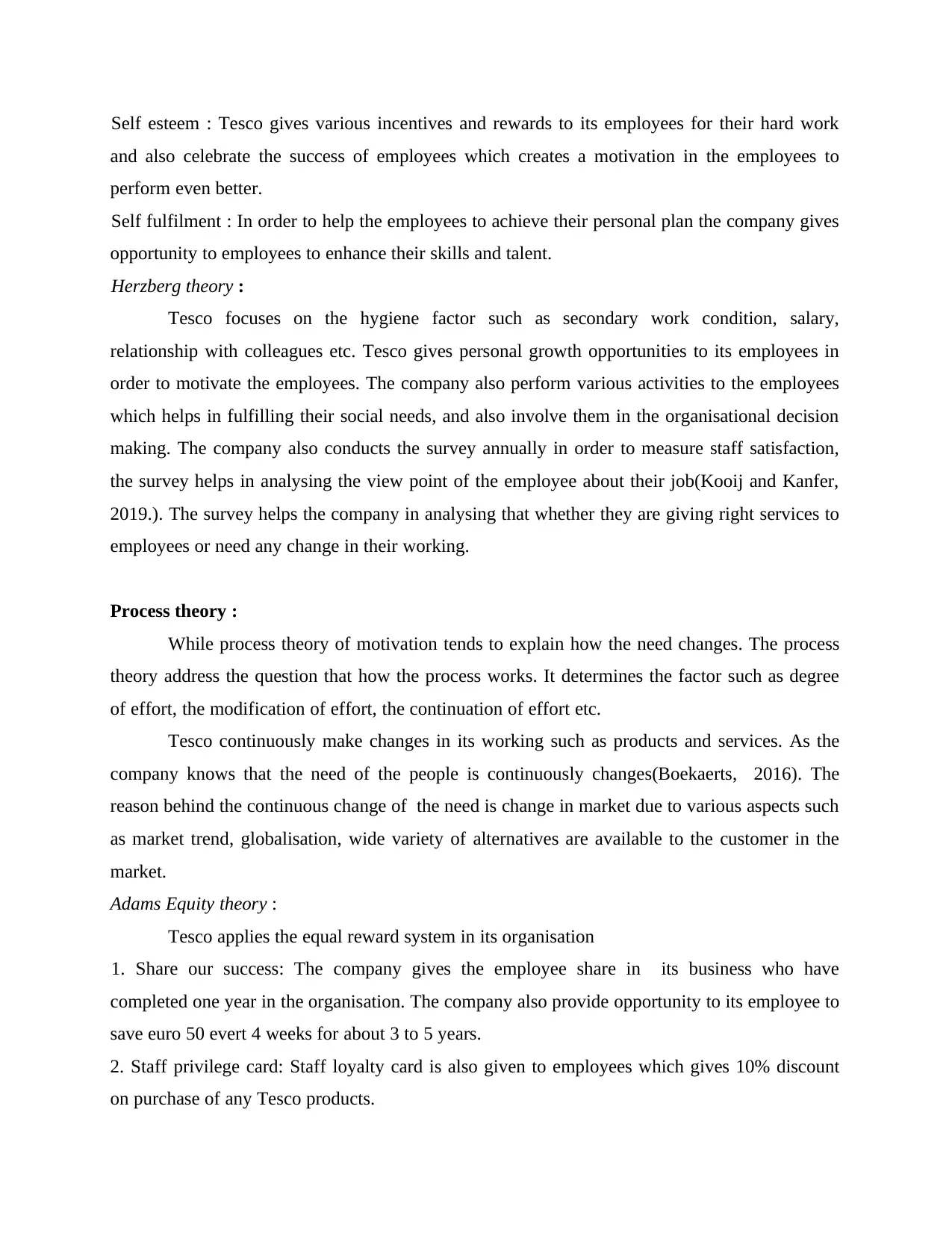
Self esteem : Tesco gives various incentives and rewards to its employees for their hard work
and also celebrate the success of employees which creates a motivation in the employees to
perform even better.
Self fulfilment : In order to help the employees to achieve their personal plan the company gives
opportunity to employees to enhance their skills and talent.
Herzberg theory :
Tesco focuses on the hygiene factor such as secondary work condition, salary,
relationship with colleagues etc. Tesco gives personal growth opportunities to its employees in
order to motivate the employees. The company also perform various activities to the employees
which helps in fulfilling their social needs, and also involve them in the organisational decision
making. The company also conducts the survey annually in order to measure staff satisfaction,
the survey helps in analysing the view point of the employee about their job(Kooij and Kanfer,
2019.). The survey helps the company in analysing that whether they are giving right services to
employees or need any change in their working.
Process theory :
While process theory of motivation tends to explain how the need changes. The process
theory address the question that how the process works. It determines the factor such as degree
of effort, the modification of effort, the continuation of effort etc.
Tesco continuously make changes in its working such as products and services. As the
company knows that the need of the people is continuously changes(Boekaerts, 2016). The
reason behind the continuous change of the need is change in market due to various aspects such
as market trend, globalisation, wide variety of alternatives are available to the customer in the
market.
Adams Equity theory :
Tesco applies the equal reward system in its organisation
1. Share our success: The company gives the employee share in its business who have
completed one year in the organisation. The company also provide opportunity to its employee to
save euro 50 evert 4 weeks for about 3 to 5 years.
2. Staff privilege card: Staff loyalty card is also given to employees which gives 10% discount
on purchase of any Tesco products.
and also celebrate the success of employees which creates a motivation in the employees to
perform even better.
Self fulfilment : In order to help the employees to achieve their personal plan the company gives
opportunity to employees to enhance their skills and talent.
Herzberg theory :
Tesco focuses on the hygiene factor such as secondary work condition, salary,
relationship with colleagues etc. Tesco gives personal growth opportunities to its employees in
order to motivate the employees. The company also perform various activities to the employees
which helps in fulfilling their social needs, and also involve them in the organisational decision
making. The company also conducts the survey annually in order to measure staff satisfaction,
the survey helps in analysing the view point of the employee about their job(Kooij and Kanfer,
2019.). The survey helps the company in analysing that whether they are giving right services to
employees or need any change in their working.
Process theory :
While process theory of motivation tends to explain how the need changes. The process
theory address the question that how the process works. It determines the factor such as degree
of effort, the modification of effort, the continuation of effort etc.
Tesco continuously make changes in its working such as products and services. As the
company knows that the need of the people is continuously changes(Boekaerts, 2016). The
reason behind the continuous change of the need is change in market due to various aspects such
as market trend, globalisation, wide variety of alternatives are available to the customer in the
market.
Adams Equity theory :
Tesco applies the equal reward system in its organisation
1. Share our success: The company gives the employee share in its business who have
completed one year in the organisation. The company also provide opportunity to its employee to
save euro 50 evert 4 weeks for about 3 to 5 years.
2. Staff privilege card: Staff loyalty card is also given to employees which gives 10% discount
on purchase of any Tesco products.
⊘ This is a preview!⊘
Do you want full access?
Subscribe today to unlock all pages.

Trusted by 1+ million students worldwide
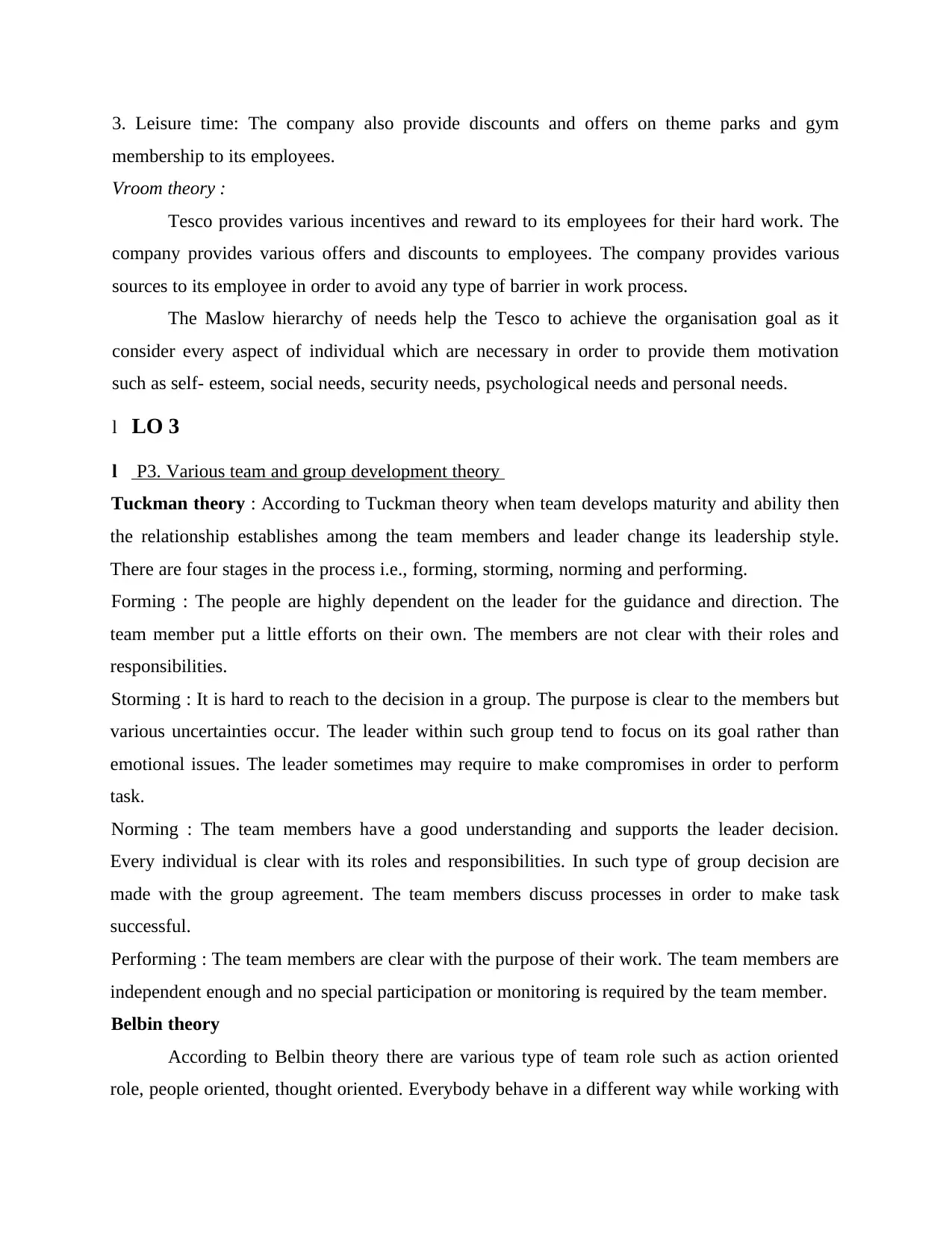
3. Leisure time: The company also provide discounts and offers on theme parks and gym
membership to its employees.
Vroom theory :
Tesco provides various incentives and reward to its employees for their hard work. The
company provides various offers and discounts to employees. The company provides various
sources to its employee in order to avoid any type of barrier in work process.
The Maslow hierarchy of needs help the Tesco to achieve the organisation goal as it
consider every aspect of individual which are necessary in order to provide them motivation
such as self- esteem, social needs, security needs, psychological needs and personal needs.
l壱LO 3
l弐 P3. Various team and group development theory
Tuckman theory : According to Tuckman theory when team develops maturity and ability then
the relationship establishes among the team members and leader change its leadership style.
There are four stages in the process i.e., forming, storming, norming and performing.
Forming : The people are highly dependent on the leader for the guidance and direction. The
team member put a little efforts on their own. The members are not clear with their roles and
responsibilities.
Storming : It is hard to reach to the decision in a group. The purpose is clear to the members but
various uncertainties occur. The leader within such group tend to focus on its goal rather than
emotional issues. The leader sometimes may require to make compromises in order to perform
task.
Norming : The team members have a good understanding and supports the leader decision.
Every individual is clear with its roles and responsibilities. In such type of group decision are
made with the group agreement. The team members discuss processes in order to make task
successful.
Performing : The team members are clear with the purpose of their work. The team members are
independent enough and no special participation or monitoring is required by the team member.
Belbin theory
According to Belbin theory there are various type of team role such as action oriented
role, people oriented, thought oriented. Everybody behave in a different way while working with
membership to its employees.
Vroom theory :
Tesco provides various incentives and reward to its employees for their hard work. The
company provides various offers and discounts to employees. The company provides various
sources to its employee in order to avoid any type of barrier in work process.
The Maslow hierarchy of needs help the Tesco to achieve the organisation goal as it
consider every aspect of individual which are necessary in order to provide them motivation
such as self- esteem, social needs, security needs, psychological needs and personal needs.
l壱LO 3
l弐 P3. Various team and group development theory
Tuckman theory : According to Tuckman theory when team develops maturity and ability then
the relationship establishes among the team members and leader change its leadership style.
There are four stages in the process i.e., forming, storming, norming and performing.
Forming : The people are highly dependent on the leader for the guidance and direction. The
team member put a little efforts on their own. The members are not clear with their roles and
responsibilities.
Storming : It is hard to reach to the decision in a group. The purpose is clear to the members but
various uncertainties occur. The leader within such group tend to focus on its goal rather than
emotional issues. The leader sometimes may require to make compromises in order to perform
task.
Norming : The team members have a good understanding and supports the leader decision.
Every individual is clear with its roles and responsibilities. In such type of group decision are
made with the group agreement. The team members discuss processes in order to make task
successful.
Performing : The team members are clear with the purpose of their work. The team members are
independent enough and no special participation or monitoring is required by the team member.
Belbin theory
According to Belbin theory there are various type of team role such as action oriented
role, people oriented, thought oriented. Everybody behave in a different way while working with
Paraphrase This Document
Need a fresh take? Get an instant paraphrase of this document with our AI Paraphraser
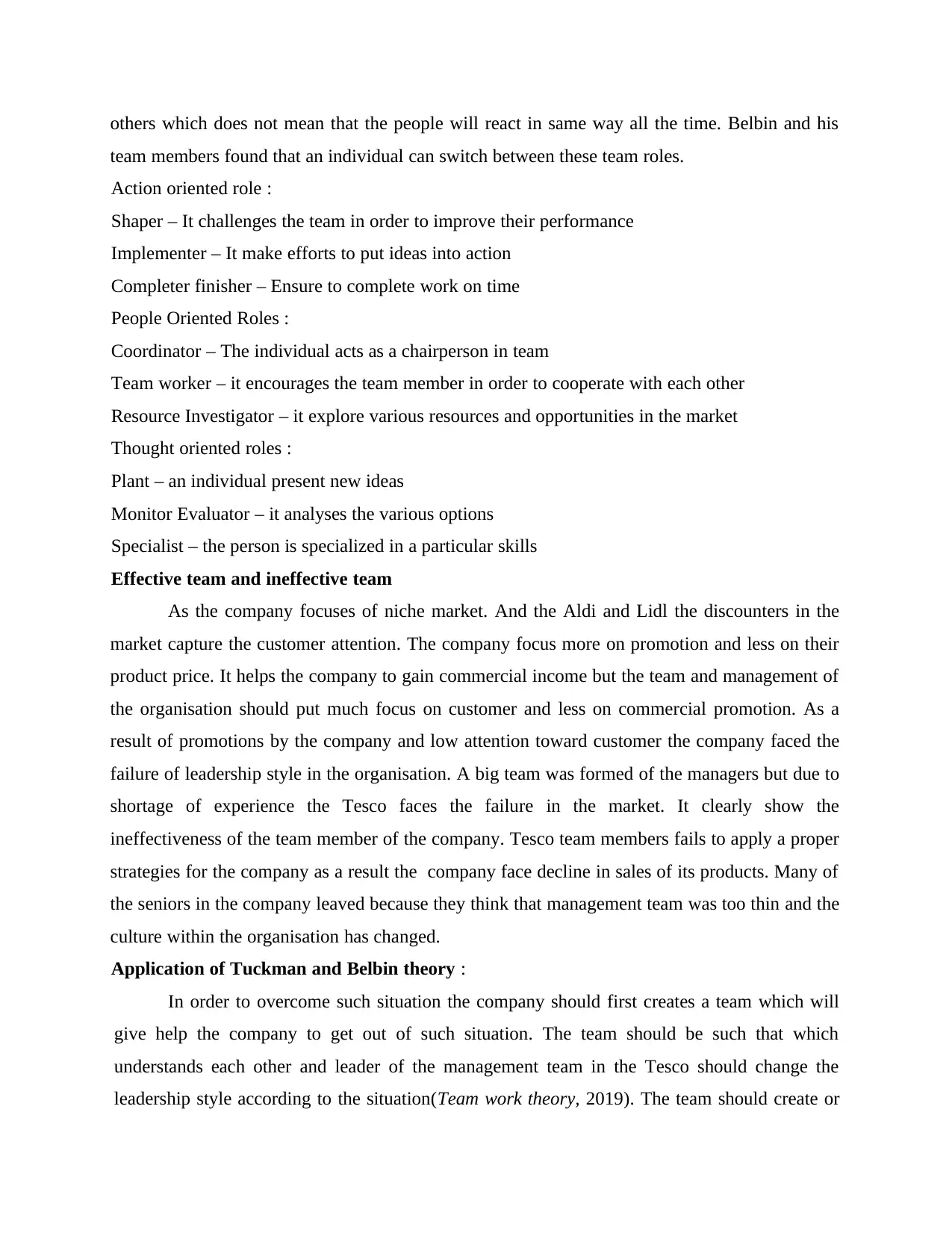
others which does not mean that the people will react in same way all the time. Belbin and his
team members found that an individual can switch between these team roles.
Action oriented role :
Shaper – It challenges the team in order to improve their performance
Implementer – It make efforts to put ideas into action
Completer finisher – Ensure to complete work on time
People Oriented Roles :
Coordinator – The individual acts as a chairperson in team
Team worker – it encourages the team member in order to cooperate with each other
Resource Investigator – it explore various resources and opportunities in the market
Thought oriented roles :
Plant – an individual present new ideas
Monitor Evaluator – it analyses the various options
Specialist – the person is specialized in a particular skills
Effective team and ineffective team
As the company focuses of niche market. And the Aldi and Lidl the discounters in the
market capture the customer attention. The company focus more on promotion and less on their
product price. It helps the company to gain commercial income but the team and management of
the organisation should put much focus on customer and less on commercial promotion. As a
result of promotions by the company and low attention toward customer the company faced the
failure of leadership style in the organisation. A big team was formed of the managers but due to
shortage of experience the Tesco faces the failure in the market. It clearly show the
ineffectiveness of the team member of the company. Tesco team members fails to apply a proper
strategies for the company as a result the company face decline in sales of its products. Many of
the seniors in the company leaved because they think that management team was too thin and the
culture within the organisation has changed.
Application of Tuckman and Belbin theory :
In order to overcome such situation the company should first creates a team which will
give help the company to get out of such situation. The team should be such that which
understands each other and leader of the management team in the Tesco should change the
leadership style according to the situation(Team work theory, 2019). The team should create or
team members found that an individual can switch between these team roles.
Action oriented role :
Shaper – It challenges the team in order to improve their performance
Implementer – It make efforts to put ideas into action
Completer finisher – Ensure to complete work on time
People Oriented Roles :
Coordinator – The individual acts as a chairperson in team
Team worker – it encourages the team member in order to cooperate with each other
Resource Investigator – it explore various resources and opportunities in the market
Thought oriented roles :
Plant – an individual present new ideas
Monitor Evaluator – it analyses the various options
Specialist – the person is specialized in a particular skills
Effective team and ineffective team
As the company focuses of niche market. And the Aldi and Lidl the discounters in the
market capture the customer attention. The company focus more on promotion and less on their
product price. It helps the company to gain commercial income but the team and management of
the organisation should put much focus on customer and less on commercial promotion. As a
result of promotions by the company and low attention toward customer the company faced the
failure of leadership style in the organisation. A big team was formed of the managers but due to
shortage of experience the Tesco faces the failure in the market. It clearly show the
ineffectiveness of the team member of the company. Tesco team members fails to apply a proper
strategies for the company as a result the company face decline in sales of its products. Many of
the seniors in the company leaved because they think that management team was too thin and the
culture within the organisation has changed.
Application of Tuckman and Belbin theory :
In order to overcome such situation the company should first creates a team which will
give help the company to get out of such situation. The team should be such that which
understands each other and leader of the management team in the Tesco should change the
leadership style according to the situation(Team work theory, 2019). The team should create or
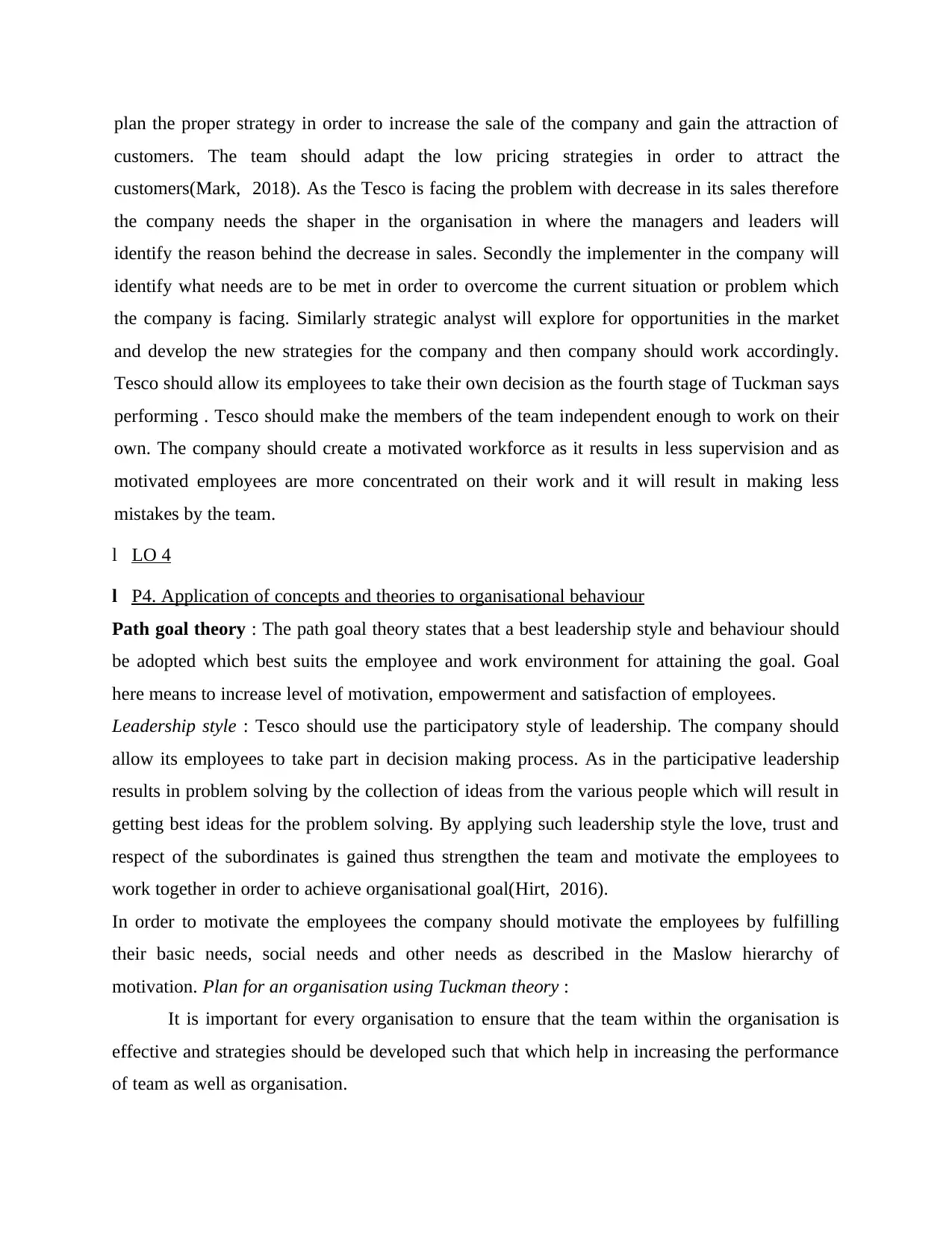
plan the proper strategy in order to increase the sale of the company and gain the attraction of
customers. The team should adapt the low pricing strategies in order to attract the
customers(Mark, 2018). As the Tesco is facing the problem with decrease in its sales therefore
the company needs the shaper in the organisation in where the managers and leaders will
identify the reason behind the decrease in sales. Secondly the implementer in the company will
identify what needs are to be met in order to overcome the current situation or problem which
the company is facing. Similarly strategic analyst will explore for opportunities in the market
and develop the new strategies for the company and then company should work accordingly.
Tesco should allow its employees to take their own decision as the fourth stage of Tuckman says
performing . Tesco should make the members of the team independent enough to work on their
own. The company should create a motivated workforce as it results in less supervision and as
motivated employees are more concentrated on their work and it will result in making less
mistakes by the team.
l壱LO 4
l弐P4. Application of concepts and theories to organisational behaviour
Path goal theory : The path goal theory states that a best leadership style and behaviour should
be adopted which best suits the employee and work environment for attaining the goal. Goal
here means to increase level of motivation, empowerment and satisfaction of employees.
Leadership style : Tesco should use the participatory style of leadership. The company should
allow its employees to take part in decision making process. As in the participative leadership
results in problem solving by the collection of ideas from the various people which will result in
getting best ideas for the problem solving. By applying such leadership style the love, trust and
respect of the subordinates is gained thus strengthen the team and motivate the employees to
work together in order to achieve organisational goal(Hirt, 2016).
In order to motivate the employees the company should motivate the employees by fulfilling
their basic needs, social needs and other needs as described in the Maslow hierarchy of
motivation. Plan for an organisation using Tuckman theory :
It is important for every organisation to ensure that the team within the organisation is
effective and strategies should be developed such that which help in increasing the performance
of team as well as organisation.
customers. The team should adapt the low pricing strategies in order to attract the
customers(Mark, 2018). As the Tesco is facing the problem with decrease in its sales therefore
the company needs the shaper in the organisation in where the managers and leaders will
identify the reason behind the decrease in sales. Secondly the implementer in the company will
identify what needs are to be met in order to overcome the current situation or problem which
the company is facing. Similarly strategic analyst will explore for opportunities in the market
and develop the new strategies for the company and then company should work accordingly.
Tesco should allow its employees to take their own decision as the fourth stage of Tuckman says
performing . Tesco should make the members of the team independent enough to work on their
own. The company should create a motivated workforce as it results in less supervision and as
motivated employees are more concentrated on their work and it will result in making less
mistakes by the team.
l壱LO 4
l弐P4. Application of concepts and theories to organisational behaviour
Path goal theory : The path goal theory states that a best leadership style and behaviour should
be adopted which best suits the employee and work environment for attaining the goal. Goal
here means to increase level of motivation, empowerment and satisfaction of employees.
Leadership style : Tesco should use the participatory style of leadership. The company should
allow its employees to take part in decision making process. As in the participative leadership
results in problem solving by the collection of ideas from the various people which will result in
getting best ideas for the problem solving. By applying such leadership style the love, trust and
respect of the subordinates is gained thus strengthen the team and motivate the employees to
work together in order to achieve organisational goal(Hirt, 2016).
In order to motivate the employees the company should motivate the employees by fulfilling
their basic needs, social needs and other needs as described in the Maslow hierarchy of
motivation. Plan for an organisation using Tuckman theory :
It is important for every organisation to ensure that the team within the organisation is
effective and strategies should be developed such that which help in increasing the performance
of team as well as organisation.
⊘ This is a preview!⊘
Do you want full access?
Subscribe today to unlock all pages.

Trusted by 1+ million students worldwide
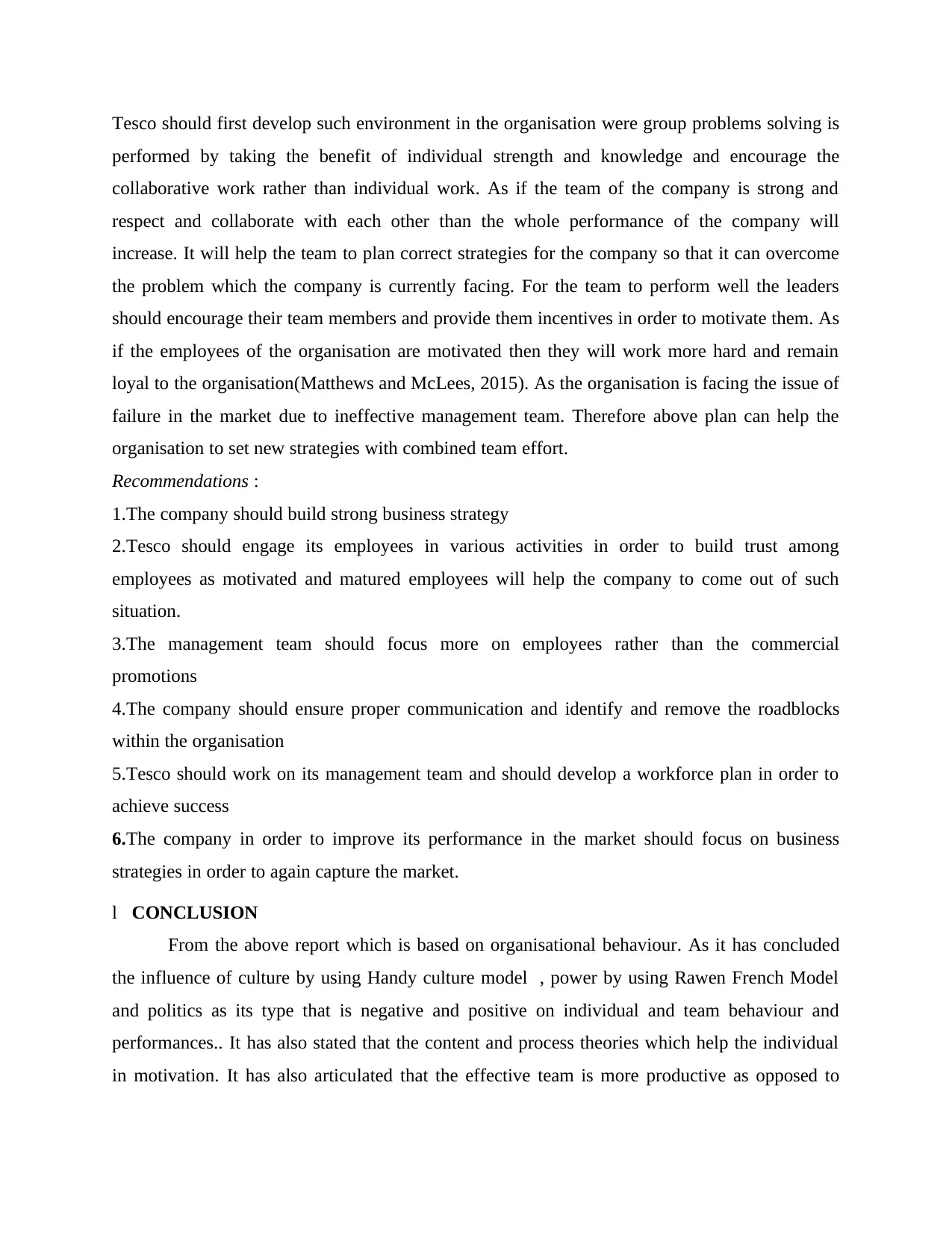
Tesco should first develop such environment in the organisation were group problems solving is
performed by taking the benefit of individual strength and knowledge and encourage the
collaborative work rather than individual work. As if the team of the company is strong and
respect and collaborate with each other than the whole performance of the company will
increase. It will help the team to plan correct strategies for the company so that it can overcome
the problem which the company is currently facing. For the team to perform well the leaders
should encourage their team members and provide them incentives in order to motivate them. As
if the employees of the organisation are motivated then they will work more hard and remain
loyal to the organisation(Matthews and McLees, 2015). As the organisation is facing the issue of
failure in the market due to ineffective management team. Therefore above plan can help the
organisation to set new strategies with combined team effort.
Recommendations :
1.The company should build strong business strategy
2.Tesco should engage its employees in various activities in order to build trust among
employees as motivated and matured employees will help the company to come out of such
situation.
3.The management team should focus more on employees rather than the commercial
promotions
4.The company should ensure proper communication and identify and remove the roadblocks
within the organisation
5.Tesco should work on its management team and should develop a workforce plan in order to
achieve success
6.The company in order to improve its performance in the market should focus on business
strategies in order to again capture the market.
l壱CONCLUSION
From the above report which is based on organisational behaviour. As it has concluded
the influence of culture by using Handy culture model , power by using Rawen French Model
and politics as its type that is negative and positive on individual and team behaviour and
performances.. It has also stated that the content and process theories which help the individual
in motivation. It has also articulated that the effective team is more productive as opposed to
performed by taking the benefit of individual strength and knowledge and encourage the
collaborative work rather than individual work. As if the team of the company is strong and
respect and collaborate with each other than the whole performance of the company will
increase. It will help the team to plan correct strategies for the company so that it can overcome
the problem which the company is currently facing. For the team to perform well the leaders
should encourage their team members and provide them incentives in order to motivate them. As
if the employees of the organisation are motivated then they will work more hard and remain
loyal to the organisation(Matthews and McLees, 2015). As the organisation is facing the issue of
failure in the market due to ineffective management team. Therefore above plan can help the
organisation to set new strategies with combined team effort.
Recommendations :
1.The company should build strong business strategy
2.Tesco should engage its employees in various activities in order to build trust among
employees as motivated and matured employees will help the company to come out of such
situation.
3.The management team should focus more on employees rather than the commercial
promotions
4.The company should ensure proper communication and identify and remove the roadblocks
within the organisation
5.Tesco should work on its management team and should develop a workforce plan in order to
achieve success
6.The company in order to improve its performance in the market should focus on business
strategies in order to again capture the market.
l壱CONCLUSION
From the above report which is based on organisational behaviour. As it has concluded
the influence of culture by using Handy culture model , power by using Rawen French Model
and politics as its type that is negative and positive on individual and team behaviour and
performances.. It has also stated that the content and process theories which help the individual
in motivation. It has also articulated that the effective team is more productive as opposed to
Paraphrase This Document
Need a fresh take? Get an instant paraphrase of this document with our AI Paraphraser
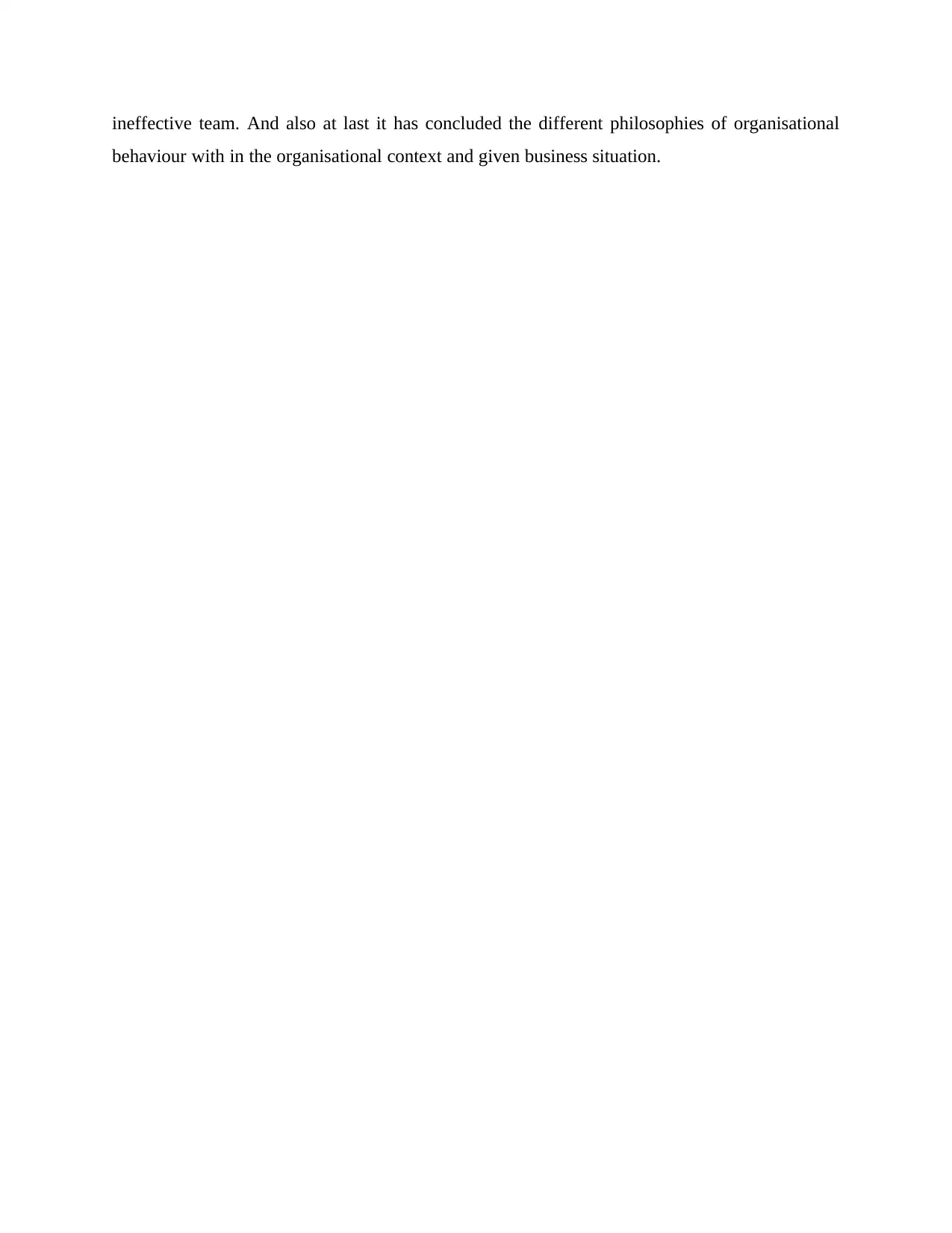
ineffective team. And also at last it has concluded the different philosophies of organisational
behaviour with in the organisational context and given business situation.
behaviour with in the organisational context and given business situation.
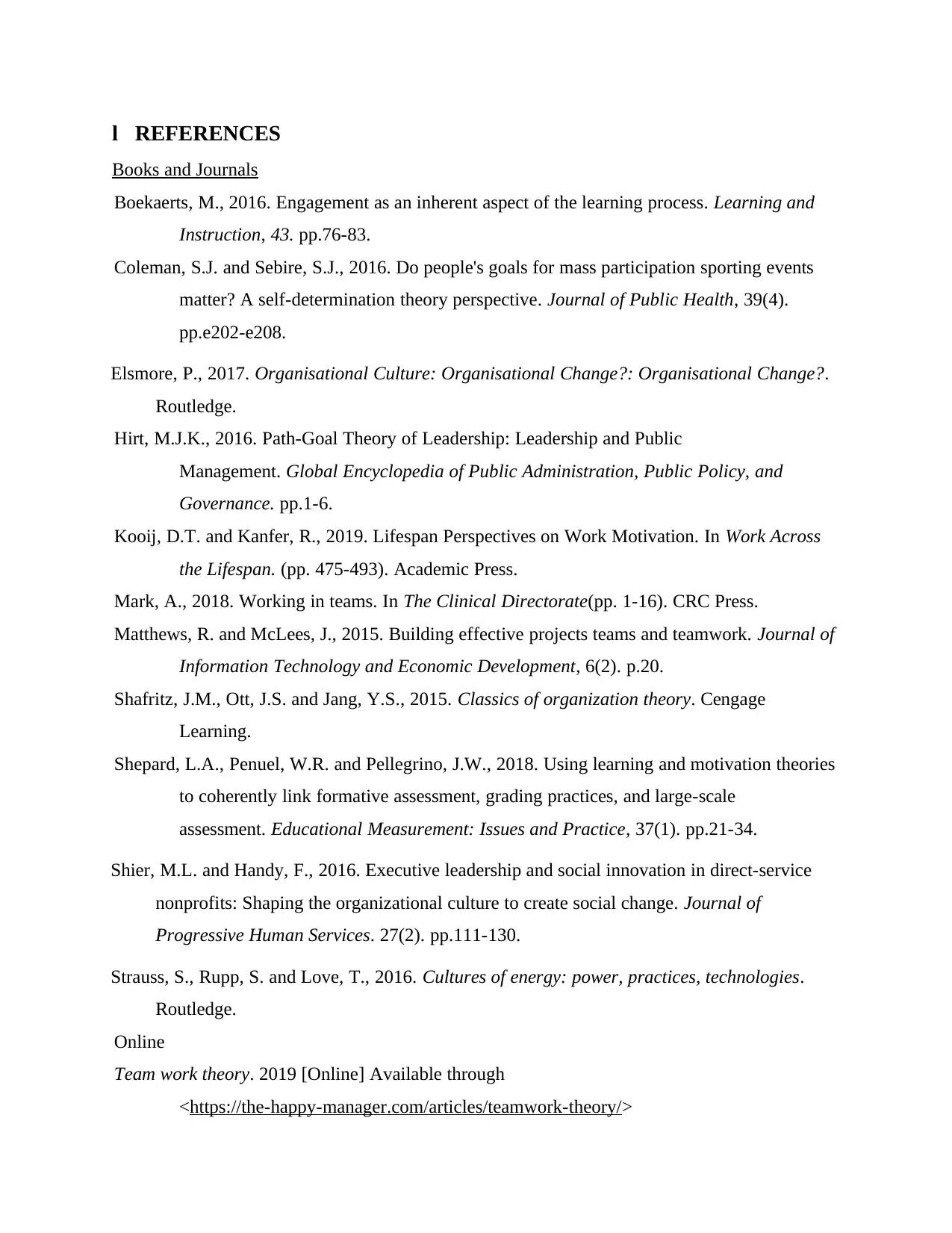
l弐REFERENCES
Books and Journals
Boekaerts, M., 2016. Engagement as an inherent aspect of the learning process. Learning and
Instruction, 43. pp.76-83.
Coleman, S.J. and Sebire, S.J., 2016. Do people's goals for mass participation sporting events
matter? A self-determination theory perspective. Journal of Public Health, 39(4).
pp.e202-e208.
Elsmore, P., 2017. Organisational Culture: Organisational Change?: Organisational Change?.
Routledge.
Hirt, M.J.K., 2016. Path-Goal Theory of Leadership: Leadership and Public
Management. Global Encyclopedia of Public Administration, Public Policy, and
Governance. pp.1-6.
Kooij, D.T. and Kanfer, R., 2019. Lifespan Perspectives on Work Motivation. In Work Across
the Lifespan. (pp. 475-493). Academic Press.
Mark, A., 2018. Working in teams. In The Clinical Directorate(pp. 1-16). CRC Press.
Matthews, R. and McLees, J., 2015. Building effective projects teams and teamwork. Journal of
Information Technology and Economic Development, 6(2). p.20.
Shafritz, J.M., Ott, J.S. and Jang, Y.S., 2015. Classics of organization theory. Cengage
Learning.
Shepard, L.A., Penuel, W.R. and Pellegrino, J.W., 2018. Using learning and motivation theories
to coherently link formative assessment, grading practices, and large-scale
assessment. Educational Measurement: Issues and Practice, 37(1). pp.21-34.
Shier, M.L. and Handy, F., 2016. Executive leadership and social innovation in direct-service
nonprofits: Shaping the organizational culture to create social change. Journal of
Progressive Human Services. 27(2). pp.111-130.
Strauss, S., Rupp, S. and Love, T., 2016. Cultures of energy: power, practices, technologies.
Routledge.
Online
Team work theory. 2019 [Online] Available through
<https://the-happy-manager.com/articles/teamwork-theory/>
Books and Journals
Boekaerts, M., 2016. Engagement as an inherent aspect of the learning process. Learning and
Instruction, 43. pp.76-83.
Coleman, S.J. and Sebire, S.J., 2016. Do people's goals for mass participation sporting events
matter? A self-determination theory perspective. Journal of Public Health, 39(4).
pp.e202-e208.
Elsmore, P., 2017. Organisational Culture: Organisational Change?: Organisational Change?.
Routledge.
Hirt, M.J.K., 2016. Path-Goal Theory of Leadership: Leadership and Public
Management. Global Encyclopedia of Public Administration, Public Policy, and
Governance. pp.1-6.
Kooij, D.T. and Kanfer, R., 2019. Lifespan Perspectives on Work Motivation. In Work Across
the Lifespan. (pp. 475-493). Academic Press.
Mark, A., 2018. Working in teams. In The Clinical Directorate(pp. 1-16). CRC Press.
Matthews, R. and McLees, J., 2015. Building effective projects teams and teamwork. Journal of
Information Technology and Economic Development, 6(2). p.20.
Shafritz, J.M., Ott, J.S. and Jang, Y.S., 2015. Classics of organization theory. Cengage
Learning.
Shepard, L.A., Penuel, W.R. and Pellegrino, J.W., 2018. Using learning and motivation theories
to coherently link formative assessment, grading practices, and large-scale
assessment. Educational Measurement: Issues and Practice, 37(1). pp.21-34.
Shier, M.L. and Handy, F., 2016. Executive leadership and social innovation in direct-service
nonprofits: Shaping the organizational culture to create social change. Journal of
Progressive Human Services. 27(2). pp.111-130.
Strauss, S., Rupp, S. and Love, T., 2016. Cultures of energy: power, practices, technologies.
Routledge.
Online
Team work theory. 2019 [Online] Available through
<https://the-happy-manager.com/articles/teamwork-theory/>
⊘ This is a preview!⊘
Do you want full access?
Subscribe today to unlock all pages.

Trusted by 1+ million students worldwide
1 out of 13
Related Documents
Your All-in-One AI-Powered Toolkit for Academic Success.
+13062052269
info@desklib.com
Available 24*7 on WhatsApp / Email
![[object Object]](/_next/static/media/star-bottom.7253800d.svg)
Unlock your academic potential
Copyright © 2020–2026 A2Z Services. All Rights Reserved. Developed and managed by ZUCOL.





